SALEM, Ore. — Gov. John Kitzhaber on Monday proposed a budget that would increase funding for education with a focus on children before they reach third grade.
With the economic recovery expected to drive up tax collections, the Democratic governor unveiled an $18.6 billion two-year budget for the state general fund and lottery.
His spending plan would be an increase of nearly 11 percent over the current budget. It would not raise taxes.
“This budget is our earnest effort to address the disparities that exist in Oregon,” said Kitzhaber, who was elected last month to a fourth term.
Kitzhaber singled out programs that would help lower-income Oregonians. He wants to offer day care subsidies to more families. And he proposed creating tax credits to ensure low-wage workers don’t abruptly lose money as their income rises and they no-longer qualify for public assistance programs.
Lawmakers are free to change or ignore Kitzhaber’s recommendations. Senate President Peter Courtney, D-Salem, said he’s asked the Legislature’s chief budget writers to release their own budget proposal by mid-January.
The final budget must be approved by the Legislature and signed by Kitzhaber before July 1.
Kitzhaber’s budget plan would increase education funding, particularly for early-childhood education, saying Oregon should ensure that 95 percent of third-graders are proficient at reading within five years, up from 68 percent now. Kitzhaber has advocated for a focus on third-grade reading during previous legislative sessions and his re-election campaign, saying students are less likely to drop out during high school if they have solid reading skills.
Altogether, he’s proposed $9.4 billion for education, with the lion’s share going to primary and secondary schools. The State School Fund, which provides most of the state money for local school districts, would rise only about 4 percent to $6.9 billion, with another $407 million earmarked for early learning programs.
Universities and community colleges would get a slight increase.
Kitzhaber celebrated his education proposal as “a historic investment in our public schools,” but the plan disappointed the powerful Oregon Education Association, the state’s largest teachers union.
The proposal would not provide enough money for schools to reduce class sizes, invest in arts and physical education or provide training for teachers, said Hanna Vaandering, president of the OEA. All those things are necessary to meet the state’s goal of a 100 percent high school graduation rate by 2025, she said.
“We’re not investing in putting class size at a level at which students can really be successful,” Vaandering said. “That needs to be addressed.”
Kitzhaber acknowledged that his proposal shortchanged higher education, saying he hopes at least $50 million more can be found. The presidents of all seven public universities released a joint statement saying his proposed $626 million for universities would not allow them to avoid tuition hikes or expand access.
“Oregon needs to rebuild a strong middle class with a workforce that is trained for today’s economy,” their statement said. “This isn’t free.”
Community colleges also were critical of the $500 million proposed for them.
Based on economists’ assumed income over the next decade, Kitzhaber said the state budget should begin running surpluses in seven years if programs continue to be funded at their current level.
He credited his health care reforms, which capped the rate of spending growth for Medicaid, the health plan for the poor. Kitzhaber said he’ll push lawmakers to expand the so-called coordinated care model from Medicaid to public employees and teachers, which he says would further reduce the state’s health care bill down the road.
Kitzhaber said he still plans to push for an overhaul of the tax code that would be sent to voters and could lead to an overall increase in state revenue. He did not discuss details but said a sales tax could not win at the ballot box.
House Republican leader Mike McLane, R-Powell Butte, offered a measured response, Kitzhaber proposed “elements of promise and areas for compromise” but is also assuming a strong economic recovery.
“We approach this current budget proposal with caution and concern – for the considerable increase in spending and for the need for proper oversight and accountability of our state resources that’s been severely lacking in recent years,” McLane said in a statement.



